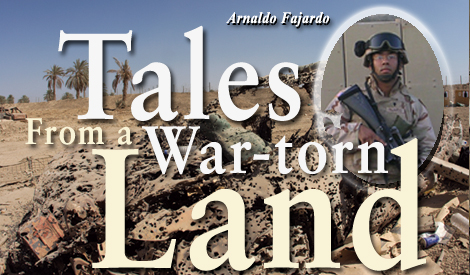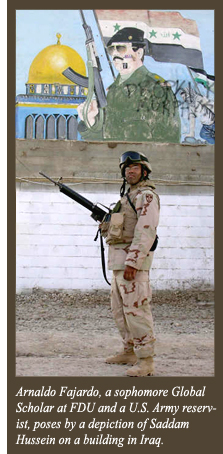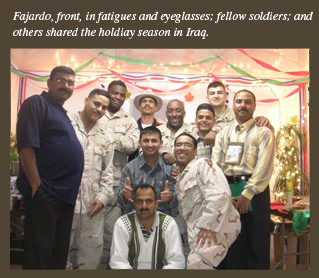
“At night, alarms
would go off and
we would have to
wake up, don all
of our gear and
go out to our
defensive
positions to
await attack.”

“I longed for my
loved ones
everyday and
thought of them
constantly.”
A Soldier’s Story
Arnaldo Fajardo initially seems like a typical Fairleigh Dickinson University sophomore. A criminal justice major, he is active with Fairleigh Dickinson’s Division I track and field team, The Equinox student newspaper, Global Scholars, the Intervarsity Christian Club and the Inspirational Gospel Ensemble. But when one looks deeper, there is nothing typical about Fajardo’s college career.
A United States Army Reservist, Fajardo has lived a life surrounded by those who serve the United States and its citizens. His father served in the Air Force and his mother in the Coast Guard. His younger sister has recently followed suit, becoming the fourth member of his immediate family to serve by joining the Marine Corps.
“I would ulti-
mately like for
our soldiers to
come home. It is
difficult over
there, and it is
hard to say if the
situation is going
to change. It’s
also hard to
discern what the
Iraqi people
really want.”

Hailing from Hoboken, N.J., 21-year-old Fajardo supported military action in Iraq and decided that he was going to contribute to the effort. “After September 11, I felt that our commander- in-chief was taking the right steps by going into Iraq. We needed to pursue those who brought so much pain to our country. That’s why I joined — to serve my country, help fight terrorism and also to further my education.”
After three months in military police training, Fajardo was assigned to Abu Ghraib prison, located west of Baghdad. He was charged with performing tower and guard duty as well as inspecting detainees’ meals to ensure that they were not tampered with.
Prior to going to Iraq, the only exposure Fajardo had to war was what he had seen on television or in the movies. The real experience was vastly different. “It really was tough being out there for so long. My most frustrating moments were the long, hard, hot days we spent out there working.”
“I longed for my loved ones everyday and thought of them constantly,” says Fajardo. “I missed my mother, father and little sister the most. It could also be scary. At night, alarms would go off and we would have to wake up, don all of our gear and go out to our defensive positions to await attack. It was frightening.”
Fajardo said that the United States’ presence in Iraq was often welcomed, but that it also depended on the individual’s situation. “The Iraqi citizens are very nice people, and each has his or her own thoughts as to what is going on in their country. While many support our presence there, many do not.”
“I remember a time when I was picking up
the civilians who supplied our bread for
the detainees. When the truck got to the gate,
we were surprised to see it riddled
with bullet holes.”“I remember a time when I was picking up the civilians who supplied our bread for the detainees. When the truck got to the gate, we were surprised to see it riddled with bullet holes. Also, the driver was not the same person we usually dealt with. The truck had been attacked by insurgents because they were supplying us with bread. We had to switch bread companies to protect them from being attacked.”

Even with the hardships of war, Fajardo reports, “I am glad that I was able to do my part to protect and serve the United States of America. The most rewarding experience was to see how much the other soldiers appreciated what they had at home.”
It is his experiences with the other soldiers and the Iraqi people that shapes Fajardo’s current attitude toward the war in Iraq and its outcome. “I would ultimately like for our soldiers to come home. It is difficult over there, and it is hard to say if the situation is going to change. It’s also hard to discern what the Iraqi people really want. What the public sees or hears on the news is only a small portion of the whole story.”
Fajardo is considering several postgraduation options. “I am still undecided as to what I want to do after graduation. There is a distinct possibility that I will stay in the military. I may end up serving our country differently by joining the ranks of the criminal justice system. With my military experience, there are a lot of possibilities for me.”
— J.D.
Surgeon Proud | Volunteer Meets Refugees | Nursing the Wounded
Scales of Justice | Article Home
FDU Magazine Home | Table of Contents | FDU Home | Alumni Home | Comments
©Copyright 2007 Fairleigh Dickinson University. All rights reserved.
For a print copy of FDU Magazine, featuring this and other stories, contact Rebecca Maxon, editor, 201-692-7024 or maxon@fdu.edu.